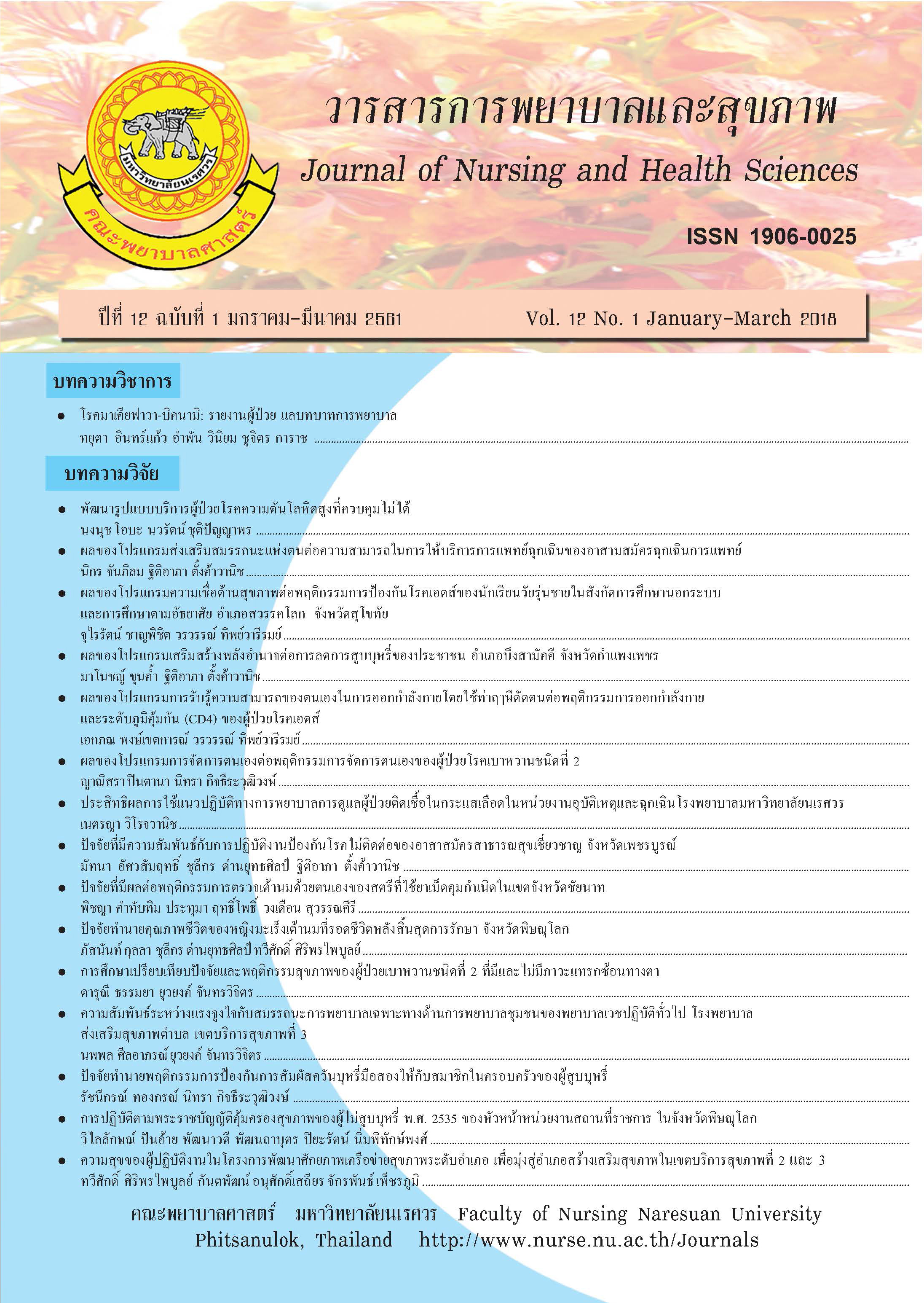ผลของโปรแกรมการจัดการตนเองต่อพฤติกรรมการจัดการตนเองของผู้ป่วยโรคเบาหวานชนิดที่ 2
Main Article Content
บทคัดย่อ
การวิจัยแบบกึ่งทดลองนี้มีวัตถุประสงค์เพื่อศึกษาผลของโปรแกรมการจัดการตนเองต่อ ความรู้ การรับรู้ ความสามารถแห่งตน พฤติกรรมการจัดการตนเองและระดับฮีโมโกลบินเอวันซีของผู้ที่เป็นโรคเบาหวาน ชนิดที่ 2 กลุ่มตัวอย่าง คือ ผู้ที่เป็นโรคเบาหวานชนิดที่ 2 จำนวน 72 ราย ได้รับการคัดเลือกแบบเฉพาะเจาะจง แบ่งเป็นสองกลุ่ม คือ กลุ่มทดลอง (36 ราย) และกลุ่มเปรียบเทียบ (36 ราย) กลุ่มทดลองเข้าร่วมโปรแกรม การจัดการตนเองภายใต้กรอบแนวคิดการจัดการตนเองของเครียร์ (Creer, 2000) เป็นระยะเวลา 10 สัปดาห์ ส่วนกลุ่มเปรียบเทียบได้รับการดูแลตามปกติ โปรแกรมประกอบด้วย คู่มือสนับสนุนการจัดการตนเอง วีดีทัศน์ แบบบันทึกการปรับเปลี่ยนพฤติกรรมการจัดการตนเอง การติดตามเยี่ยมทางโทรศัพท์และเยี่ยมบ้าน เก็บรวบรวมข้อมูลโดยใช้เครื่องมือ 5 ชนิด ประกอบด้วย 1) แบบสอบถามข้อมูลส่วนบุคคล 2) แบบสอบถาม ความรู้ 3) แบบสอบถามการรับรู้ความสามารถแห่งตนของผู้ที่เป็นโรคเบาหวาน 4) แบบสอบถามพฤติกรรม การจัดการตนเองและ 5) เครื่องมือตรวจวิเคราะห์ค่าฮีโมโกลบินเอวันซี (HbA1c) ที่ผ่านการตรวจสอบตาม มาตรฐานของโรงพยาบาลวิเคราะห์ข้อมูลโดยใช้สถิติเชิงพรรณนา สถิติทดสอบทีแบบคู่ และทีแบบอิสระ ผลการศึกษาพบว่าคะแนนเฉลี่ยความรู้การรับรู้ความสามารถแห่งตนพฤติกรรมการจัดการตนเองของ กลุ่มทดลองสูงกว่ากลุ่มเปรียบเทียบอย่างมีนัยสำคัญทางสถิติ (p < 0.001, 0.05, 0.05) ตามลำดับส่วนค่าเฉลี่ย ของระดับฮีโมโกลบินเอวันซีของกลุ่มทดลองต่ำกว่ากว่ากลุ่มเปรียบเทียบอย่างมีนัยสำคัญทางสถิติ (p < 0.05) และพบว่าเมื่อเสร็จสิ้นการทดลองภายในกลุ่มทดลองมีคะแนนเฉลี่ยความรู้ การรับรู้ความสามารถแห่งตน พฤติกรรมการจัดการตนเองหลังทดลองสูงกว่าก่อนทดลองอย่างมีนัยสำคัญทางสถิติ (p < 0.001, 0.05, 0.001) ตามลำดับ ส่วนค่าเฉลี่ยของระดับฮีโมโกลบินเอวันซีหลังทดลองลดลงกว่าก่อนทดลองอย่างมีนัยสำคัญ ทางสถิติ (p < 0.001) ข้อเสนอแนะจากการศึกษานี้ คือ เจ้าหน้าที่สาธารณสุขสามารถใช้โปรแกรมการจัดการ ตนเองเพื่อส่งเสริมพฤติกรรมการจัดการตนเอง ในผู้ป่วยเบาหวานชนิดที่ 2 เพื่อนำไปสู่การควบคุมระดับน้ำตาล
Article Details
เอกสารอ้างอิง
สาธารณสุข. (2556). การออกกำลังกายเพื่อ
สุขภาพสำหรับผู้ป่วยโรคเบาหวาน [วีดิทัศน์].
นนทบุรี: กองออกกำลังกายเพื่อสุขภาพ
กรมอนามัย กระทรวงสาธารณสุข.
ชรินทร์ หาญสืบสาย. (2556). เขตเศรษฐกิจพิเศษ
“แม่สอด”. สารวุฒิสภา, 21(2), 26-27.
นฤมล ฮาตไชย. (2556). ผลของการใช้โปรแกรมการ
จัดการตนเองของผู้ป่วยโรคเบาหวานชนิดที่ 2
ที่มีโรคไตเรื้อรังร่วมต่อพฤติกรรมการจัดการ
ตนเอง (วิทยานิพนธ์ปริญญามหาบัณฑิต).
ขอนแก่น: มหาวิทยาลัยขอนแก่น.
ปุญญพัฒน์ ไชยเมล์. (2556). การกำหนดขนาดตัวอย่าง
สำหรับการวิจัยเชิงพรรณนาในงานสาธารณสุข.
วารสารมหาวิทยาลัยทักษิณ, 16(2), 9-18.
ปรีดา กังแฮ, และชดช้อย วัฒนะ. (2558). ประสิทธิผลของ
โปรแกรมการเสริมสร้างพลังอำนาจในการ
จัดการตนเองต่อความรู้เกี่ยวกับโรคเบาหวาน
พฤติกรรมการจัดการตนเอง และการควบคุม
ระดับน้ำตาลในเลือด ของผู้ป่วยโรคเบาหวาน
ชนิดที่2. วารสารวิทยาลัยพยาบาลพระปกเกล้า
จันทบุรี,26(2), 63-77.
แผนงานเครือข่ายควบคุมโรคไม่ติดต่อ กระทรวง
สาธารณสุข. (2559).รายงานสถานการณ์โรค
NCDs ฉบับที่ 2. นนทบุรี: สำนักงานพัฒนา
นโยบายสุขภาพระหว่างประเทศกระทรวง
สาธารณสุข.
พัชรี อ่างบุญตา. (2554). ผลของโปรแกรมสนับสนุน
การจัดการตนเองต่อพฤติกรรมการจัดการตนเอง
และระดับฮีโมโกลบินเอวันซีของผู้สูงอายุที่
เป็นโรคเบาหวานชนิดที่ 2 (วิทยานิพนธ์ปริญญา
มหาบัณฑิต).เชียงใหม่: มหาวิทยาลัยเชียงใหม่.
โรงพยาบาลแม่สอด. (2556). คู่มือการใช้บริการทาง
ห้องปฏิบัติการ. ตาก: โรงพยาบาลแม่สอด.
โรงพยาบาลแม่สอด. (2557). Service Plan. ตาก:
โรงพยาบาลแม่สอด.
โรงพยาบาลสมเด็จพระยุพราชตะพานหิน, สำนักงาน
สาธารณสุขอำเภอตะพานหิน และโรงพยาบาล
ส่งเสริมสุขภาพตำบลวังหว้า. (2554). อาหารกับ
โรคเบาหวาน [วีดิทัศน์]. พิจิตร: เคอาร์อาร์เค
สตูดิโอ.
วิโรจน์ เจียมจรัสรังษี. (2550). การทบทวนวรรณกรรม
เรื่องต้นแบบการดูแลผู้ป่วยโรคเรื้อรัง (Chronic
Care Model หรือ CCM). สืบค้นจาก http://
kb.hsri.or.th/ dspace/handle/11228/2100
สถาบันวิจัยและประเมินเทคโนโลยีทางการแพทย์
กรมการแพทย์ กระทรวงสาธารณสุข (2554).
การป้องกันและจัดการโรคเบาหวาน ตอน
เบาหวานจัดการได้[วีดิทัศน์]. นนทบุรี: สำนัก
สารสนเทศการแพทย์ กรมการแพทย์กระทรวง
สาธารณสุข.
อรุณ จิรวัฒน์กุล. (2551). ชีวสถิติสำหรับงานวิจัยทาง
วิทยาศาสตร์สุขภาพ. ขอนแก่น: ภาควิชาสถิติ
และประชากรศาสตร์คณะสาธารณสุขศาสตร์
มหาวิทยาลัยขอนแก่น.
Bandura, A. (1997). Self-efficacy: The exercise of
control. New York: W.H Freeman.
Chrvalaa, C.A. ,Sherrb, D., &Lipmanb, R.D. (2016).
Diabetes self-management education for
adults with type 2 diabetes mellitus: A systematic
review of the effect on glycemic control. Patient
Education and Counseling, 99(6), 926-943.
Creer, L. T. (2000). Self-management of chronic illness.
In M. Boekaerts, P. R. Printrich, & M. Zeidner
(Eds.), Handbook of self-regulation (pp.601-
629). San Diego, CA: Academic.
Dhillon, P.K., Jeemon, P., Arora, N.K., Mathur, P.,
Maskey, M., Sukirna, R.D., &Prabhakaran, D.
(2012). Status of epidemiology in the WHO
South-East Asia region: burden of disease,
determinants of health and epidemiological
research, workforce and training capacity.
International Journal of Epidemiology.doi:
10.1093/ije/dys046
Hu, H., Li, G., &Arao, T. (2013). Validation of a Chinese
version of the self-efficacy for managing Chronic
disease 6-item scale in patients with
hypertension in primary care. ISRN Public
Health,Retrieved from https://www.hindawi.
com/journals/isrn/2013/298986/
Jonker, A. C., Comijs, H. C., Knipscheer, K. M., &
Deeg, D. H. (2009). Promotion of selfmanagement
in vulnerable older people:
A narrative literature review of outcomes of
the Chronic disease self-management program
(CDSMP). European Journal Of Ageing, 6(4),
303-314.
Polit, D. F., & Beck, C. T. (2008). Nursing research:
Generating and assessing evidence for nursing
practice. Philadelphia: Lippincott Williams
and Wilkins.
Quandt, S., Ip, E., Kirk, J., Saldana, S., Chen, S.,
Nguyen, H., & ... Arcury, T. (2014). Assessment
of a short diabetes knowledge instrument for
older and minority adults. Diabetes Educator,
40(1), 68-76.
Schmitt, A., Gahr, A., Hermanns, N., Kulzer, B., Huber,
J., &Haak, T. (2013). The diabetes selfmanagement
questionnaire (DSMQ):
Development and evaluation of an instrument
to assess diabetes self-care activities associated
with glycaemic control. Health & Quality Of
Life Outcomes, 11(1), 1-14.
Thoolen, B., De Ridder, D., Bensing, J., Maas, C.,
Griffin, S., Gorter, K., & Rutten, G. (2007).
Effectiveness of a self-management intervention
in patients with screen-detected type 2 diabetes.
Diabetes Care, 30(11), 2832-2837.


